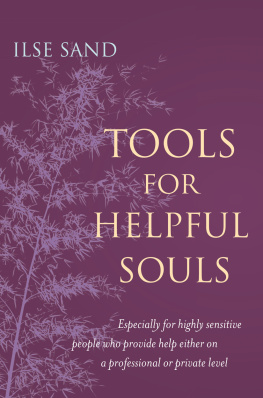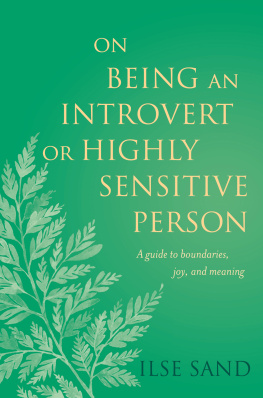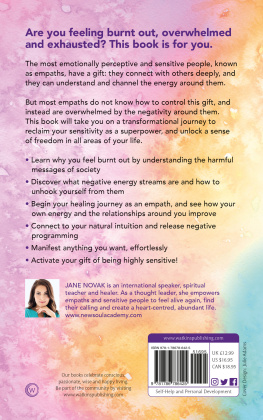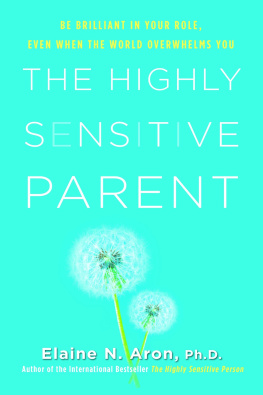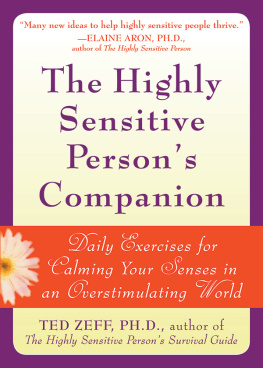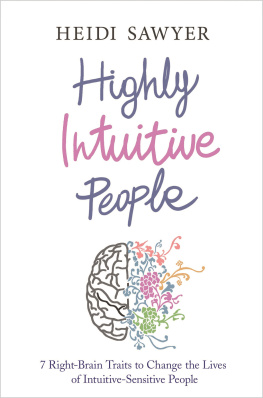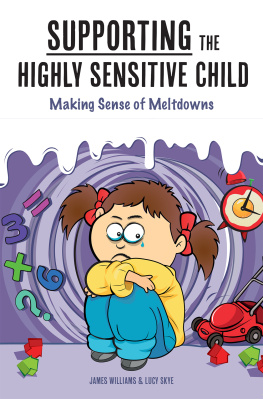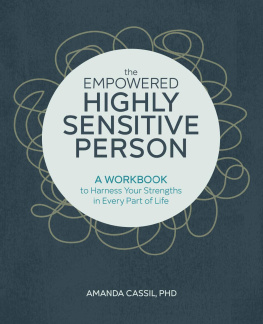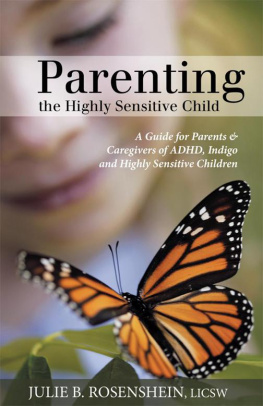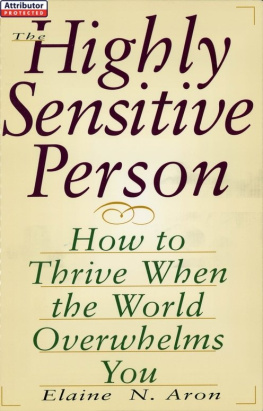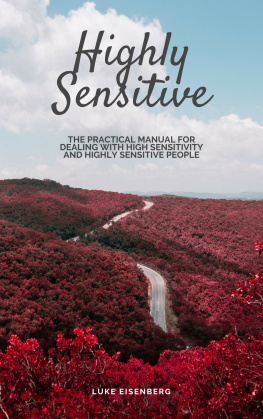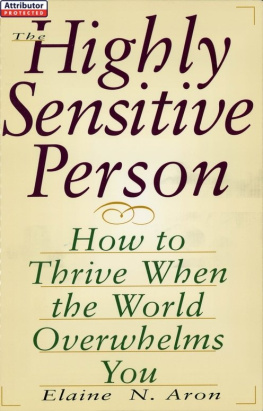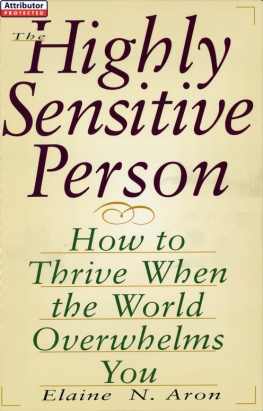
T OOLS FOR H ELPFUL S OULS
Especially for highly sensitive people who provide help either on a professional or private level
I LSE S AND

Jessica Kingsley Publishers
London and Philadelphia
C ONTENTS
P REFACE
This book is a practical guide in using specifically selected, simple psychotherapeutic methods in supportive dialogues, whether they take place in a kitchen, on a hiking trip, in a clinic or at a patients bedside.
Highly sensitive people tend to get drained more quickly than do most other people when in the company of individuals who are out of balance. That is why it is particularly crucial that on the one hand they become worn down as minimally as possible but on the other hand are capable of providing the maximum assistance to the person they are helping.
If you are highly sensitive then you know what it feels like to be burdened by the imbalances in your surroundings. There are two ways for you to solve the problem: you can either remove yourself from the situation or you can try to help alleviate it. The times where you choose to help, you can utilise the tools in this book to your advantage.
Most of the tools in this book can also be used with your own self-development in mind. If you ask yourself some of the questions or do some of the exercises that youll find in this book, you will actually be optimising and strengthening your own self-development.
The book concludes with a chapter explaining why it is both very demanding and at the same time very rewarding to be a helper when you are highly sensitive and provides instructions on how you can also tend to yourself.
I have a degree in psychotherapy within various different areas. Of the many methods that I myself employ I have chosen to select a few that are easy to use.
There are some psychotherapeutic tools, which ought to be used solely by a professional psychotherapist or psychologist. But there are also others that can be used in beneficial ways outside of the psychotherapeutic sphere, as, for example, when you help clients, patients, friends or yourself. It is the latter which I will be focusing on in this book in what will be practically a cook-book style format.
The tools are geared towards optimising a helpful and supportive conversation. However, there are many other ways to help someone. I have spoken with highly sensitive people who have either invited their ageing parents to come live at home with them, or who have spent a lot of their time caring for or helping the sick, or driving people who cant get around or working as their chauffeurs. If you are the kind of person who mainly helps others with practical things and find yourself feeling over-burdened from time to time, you may benefit greatly from reading in this book, which contains suggestions as to how you as a helper can better tend to yourself and your own needs.
The book is written in a language that is easily comprehensible and provides many examples so that anyone interested in psychology will benefit from reading it. It is at the same time solidly based on theories recognised within the field of psychology and on the experiences I have gained from practising psychotherapy for many years.
The many concrete examples given in the book are for the most part designed for educational purposes but contain examples of situations and statements, which I often encounter in my role as helper. A few of the examples are based on real life situations and used anonymously with the permission of the client in question.
You will get more out of the book if you read the chapters consecutively, but it can also be used as a reference book.
Lading, June 2014
I NTRODUCTION
For several years now I have held courses and lectures for highly sensitive people as well as met them through my practice in psychotherapy. I have heard many of them talk about how they have tried to remedy the imbalance in their surroundings or in their own lives. I have seen how much of themselves they are willing to invest in order to help alleviate it, how oppressive it gets for them when the help doesnt work and how their enthusiasm and joy blossom when they finally manage to make a positive change for others or themselves.
Many highly sensitive people report that they have tried to create a sense of peace and joy in their surroundings ever since they were children. For example, if their mother was sad they would attempt to alleviate her distress, which they might do by drawing her a picture or by behaving exceptionally well. As they grew older they were often given the role of the one whom the other members in the family would refer to if they needed help or they would be the one who would secretly help others without anyone else discovering it. However, all the others would see would be a person who seemed to get more easily tired.
A number of highly sensitive people choose caretaking as their vocation in their adult life, which is an obvious choice considering that they have practised helping others all their lives and have therefore developed excellent competences in the field. They often become popular caretakers; however, the problem for them is that they tend to become easily over-stimulated and therefore need to take more breaks than most people because if they arent given the chance to do so they end up going home utterly exhausted, their risk of suffering adverse health effects increased due to stress.
Highly sensitive people are more impressionable. Another way of putting it is that it is easy to make an impression on someone who is sensitive. Most people like making an impression. It can be emotionally extremely satisfying to see what one has said or expressed so clearly imprinted on the faces of others.
The way in which highly sensitive people can provide a sense of relief for others became very clear to me when I was teaching a course for a small group of sensitive people. On the way to the place where the course was to be held I had almost backed into someone elses car and was trembling within by the time I reached my destination. I told the course participants about my experience and saw how my sense of shock was immediately imprinted onto all their sensitive faces. At that very moment I also felt how my own inner sense of shock disappeared; it was as though all the unpleasantness I had been feeling evaporated into thin air, leaving me with a sense of relief that increased my energy and sense of joy.
Many highly sensitive people are not at all aware of how potentially great their help can be. They typically have a desire to make the world a better place but they often do not know exactly how they should go about using their talent to do so and therefore sometimes end up wasting it by helping others with things that are not fruitful in the long run.
To unload your feelings and see them reflected in the facial expression of someone else is a great relief in the short term. But if that is all that occurs it will not necessarily lead to any kind of transformation. Or perhaps the one doing the unloading will, instead, find that he or she is dependent on the one doing the listening and so does not exercise how to contain his or her own feelings or to make the necessary changes in his or her life to get better.
Highly sensitive people who work as helpers either professionally or privately have a greater risk of being used as receptacles for other peoples feelings or frustrations. It is therefore very important that they find ways to look out for themselves and to help others in ways that are as efficient as possible yet without overburdening themselves.
Next page
